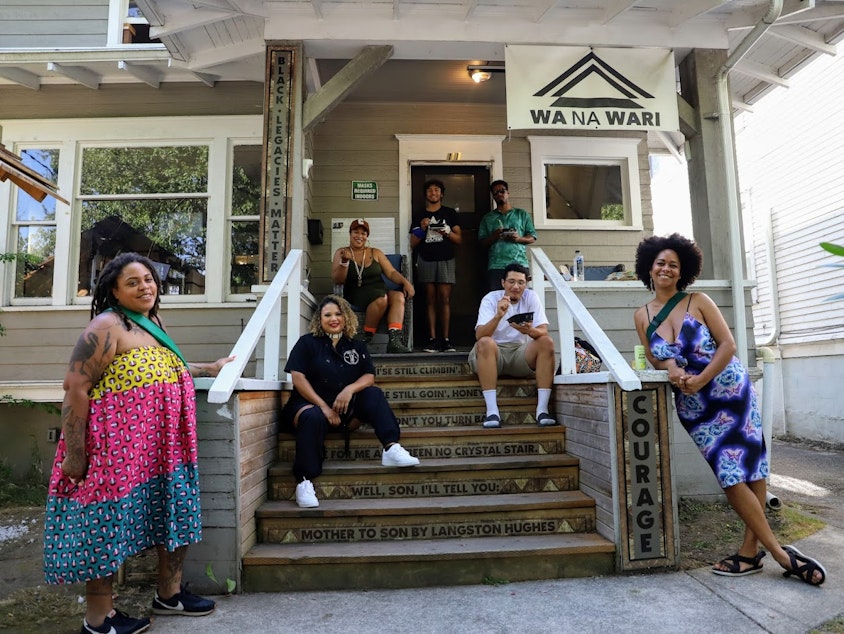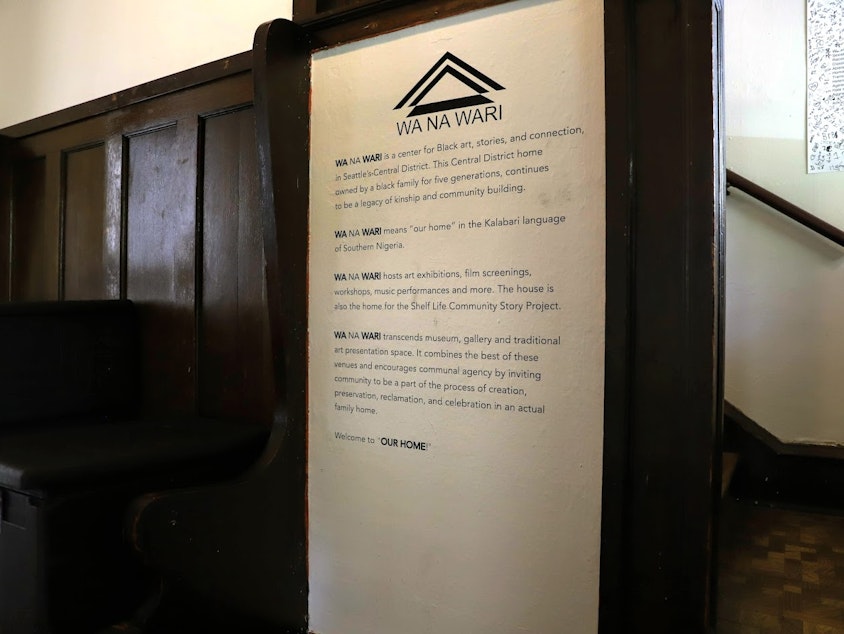This Seattle arts space provides sustenance to the Black community

W
hen you think of an arts space, you think of pictures, paintings, or other kinds of visual art – they’re the main course. But also on the menu at Wa Na Wari in Seattle’s Central District is food. Three days a week, this center for Black art gives out free meals to anyone who drops by.
Omar Abdullah happened to walk by Wa Na Wari on 24th Avenue, when a friendly face approached him with a question.
“Have you had dinner?” asked Eula Scott Bynoe.
“No,” answered Abdullah.
Scott offered him a hot meal.
“I’ve got vegetarian plates left,” Bynoe said. “It’s mushrooms with quinoa and a bunch of good stuff.”
It just happens that Abdullah is on his way to buy some food. He is grateful for the offer.
“You are a blessing for real, all around,” he said.
The meals are not just for people in need. Bynoe, a doula and podcaster, said many of those who partake are folks like herself who are employed but who could use a break.
“Teachers, regular everyday clerks, people who work at coffee shops,” Bynoe said. “It’s not like they’re not working class people. It’s just that everything is more expensive –it stretches the week, it stretches the money.”
Plus, Bynoe said, everybody could use a healthy, tasty meal.
“Every single time you come, the food is amazing," she said. "It’s prepackaged and you can walk up to the door and grab it and go.”
The meal program is called "Love Offering." It started early in the pandemic as a way to support BIPOC (Black, Indigenous, and people of color) chefs who lost their jobs when restaurants and the hospitality industry were forced to shut down.
Lakea Osias, one of the three rotating chefs in the program, specializes in Louisiana style Cajun cuisine. She said the program provided financial stability at the height of the pandemic, and more.
“It’s an opportunity to give back," Osias said, "to give back something I’m passionate about, and share that passion with the people in the community.”
She sees the meals as a way of bringing people together.
Domain Brown, an artist and IT technician, is a transplant from Tacoma who’s become a regular and a volunteer.
“Especially as a Black person in Seattle, it’s nice to have a place of brown people that are welcoming you and want to be around you,” Brown said.

Love Offering started when WASAT, a Seattle based Muslim nonprofit, approached Wa Na Wari about distributing the meals. Elisheba Johnson, one of the cofounders of Wa Na Wari, said the program resonated so much that they decided to expand it, thanks to a city grant.
“There’s so much joy and community around food," Johnson said. "So, people can come and hang out and make new friends and see really great art.”
Galleries often offer wine and cheese at art openings. But Johnson said Wa Na Wari’s food offers sustenance.
“I think that Black and Brown arts institutions are like a nucleus for the community,” she said. “There are a lot of arts and cultural organizations over the pandemic started doing mutual aid work… I think we’re always thinking that way.”
This historic Black neighborhood has seen many longtime residents displaced as new apartment buildings and townhouses replace old family homes. According to Redfin, housing prices in July were up just over 13 percent compared to last year. The median selling price was $973,000.
But there are efforts to reverse gentrification by setting aside units for affordable housing, and creating space for Black-owned businesses.
Johnson said Love Offering is a way of taking care of the community’s well-being.
“People are staying after six o’clock and just hanging out in the porch," she said.
It’s a place where people can just sit, have a conversation and not feel rushed, a place that encourages people to linger, whether they’re longtime residents or newcomers to the neighborhood.
Correction notice: A previous audio version of this story incorrectly stated Eula Scott Bynoe's name.




